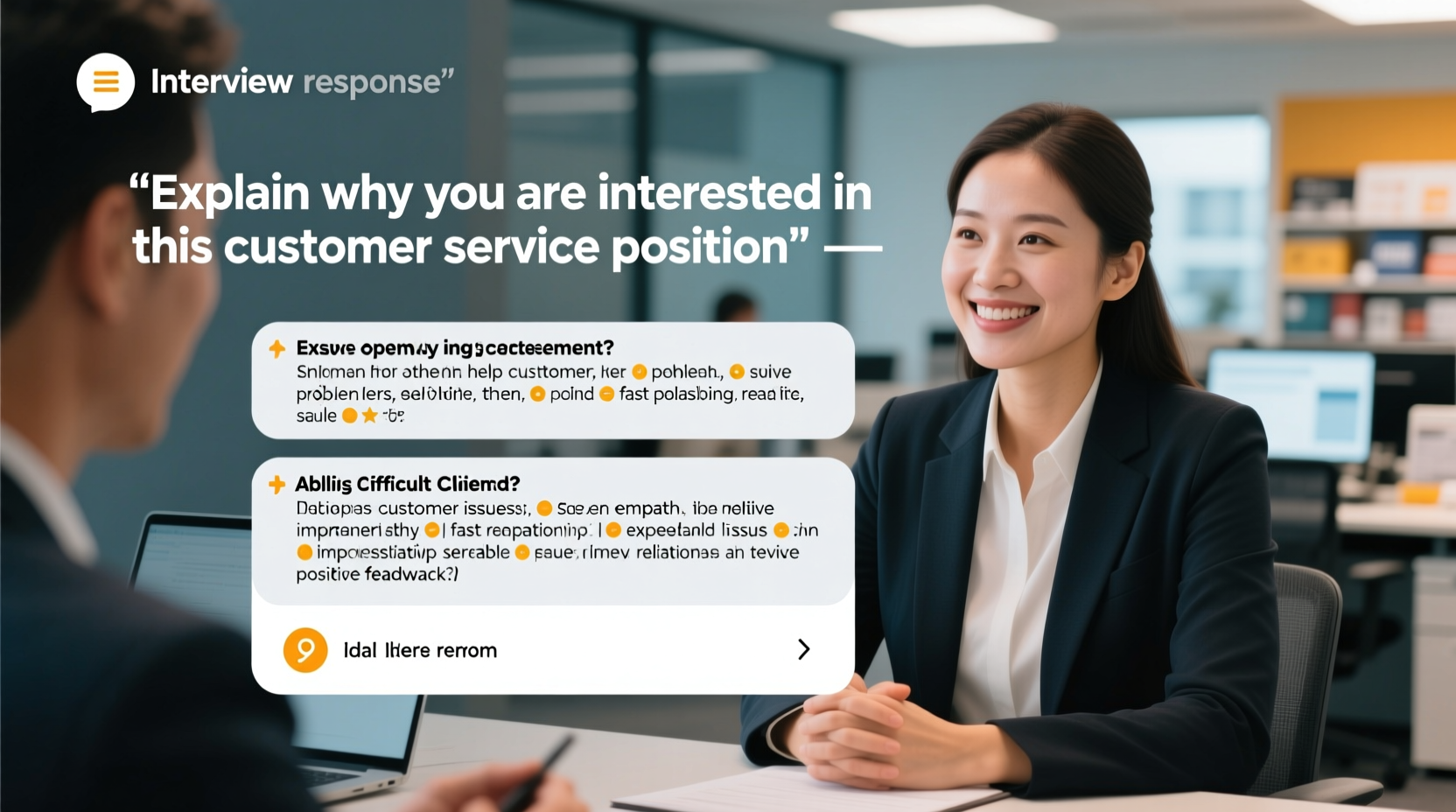When applying for a customer service role, one of the most frequently asked interview questions is: “Why does this customer service position interest you?” How you answer can make the difference between landing the job or being passed over. A strong response shows that you’ve researched the company, understand the role’s responsibilities, and are genuinely passionate about helping people. It’s not enough to say you “like talking to people.” Employers want depth—specific motivations aligned with their values and goals.
This guide provides practical, real-world examples of how to answer this question effectively. Whether you're applying at a tech startup, retail chain, or healthcare provider, these insights will help you craft a personalized, memorable response that highlights your strengths and alignment with the organization.
Understanding What Employers Really Want

At first glance, the question seems simple. But hiring managers use it to assess several key qualities:
- Your level of preparation and research about the company
- Your understanding of what customer service truly entails
- Your motivation beyond just needing a paycheck
- Whether your personal values align with the company culture
- Your communication skills and ability to articulate ideas clearly
A generic answer like “I enjoy helping people” may be true, but it lacks specificity. To stand out, connect your personal strengths and experiences directly to the company’s mission, customer base, or service philosophy.
Strong Answer Frameworks and Examples
The best responses follow a clear structure: Passion + Research + Relevance. Start with what draws you to customer service, add specific details about the company, then explain how your skills fit the role.
Example 1: For a Tech Company Emphasizing Innovation
“I’ve always been drawn to customer service because I thrive on solving problems in real time. What excites me about this position at TechFlow is your reputation for using AI-powered support tools to enhance customer experience without losing the human touch. In my previous role, I reduced average resolution time by 25% by mastering internal systems quickly and anticipating user needs. Being part of a team that values both efficiency and empathy aligns perfectly with how I approach service.”
Example 2: For a Retail Brand Focused on Customer Loyalty
“This role stands out because of your brand’s focus on building long-term relationships rather than just processing transactions. I admire how your stores train associates to remember regular customers’ preferences—it reflects a culture of genuine care. As someone who once turned around a negative review by personally following up with a dissatisfied shopper, I’m motivated by moments where service creates loyalty. Contributing to that kind of experience every day is exactly why I want to work here.”
Example 3: For a Healthcare Provider Prioritizing Compassion
“Customer service in healthcare isn’t just about answering questions—it’s about providing clarity during stressful times. Your clinic’s patient-first policy, including after-hours callback support, shows a deep commitment to accessibility and compassion. That resonates with me. I volunteered as a helpline operator for a mental health nonprofit, where active listening and calm communication made a tangible difference. This role offers the chance to combine those skills with professional growth in a mission-driven environment.”
Do’s and Don’ts When Answering This Question
| Do | Don't |
|---|---|
| Research the company’s service model, values, and recent news | Rely solely on vague statements like “I like helping others” |
| Mention a specific program, award, or initiative the company runs | Use the same answer for every company regardless of industry |
| Tie in relevant past experience—even if not in customer service | Focus only on what the job can do for you (e.g., flexible hours) |
| Highlight soft skills like patience, adaptability, and emotional intelligence | Speak negatively about past employers or customers |
| Keep your answer under 90 seconds | Overload with jargon or overly technical terms |
“Candidates who explain *why us*, not just *why customer service*, show they’re invested—not just interested.” — Lisa Tran, HR Director at NexaSupport Inc.
Mini Case Study: From Generic to Impactful Answer
Samantha applied for a customer service role at GreenPath Organics, an eco-conscious grocery delivery service. Her initial answer was:
“I like this position because I enjoy talking to people and solving problems.”
After refining her response with research, she said:
“I’m passionate about sustainable living, which is why GreenPath stood out to me. I read about your zero-waste packaging initiative and how reps are encouraged to educate customers on recycling options. In my last role, I helped implement a feedback system that improved customer satisfaction scores by 30%. Combining my service experience with a mission I believe in—that’s what makes this opportunity truly exciting.”
She got the job. The revised answer demonstrated knowledge, values alignment, and measurable impact.
Step-by-Step Guide to Crafting Your Own Answer
- Research the company: Visit their website, read their blog, check social media, and look for press releases or awards related to customer experience.
- Identify their core service values: Are they fast? Empathetic? Innovative? Personalized? Find clues in customer testimonials or employee reviews.
- Reflect on your own motivations: Why do you enjoy helping people? Is it problem-solving? Building trust? Making someone’s day better?
- Select a relevant skill or experience: Choose one example that demonstrates your ability to deliver excellent service.
- Combine all elements into a concise statement: Use the Passion + Research + Relevance formula to build a natural-sounding answer.
- Practice aloud: Time yourself and ensure clarity and confidence without sounding rehearsed.
Frequently Asked Questions
What if I have no prior customer service experience?
You can draw from volunteer work, group projects, or even family responsibilities where you resolved conflicts or supported others. For example: “While I haven’t worked in formal customer service, I coordinated event logistics for a student group, where I managed attendee concerns and ensured smooth communication. That experience taught me how to stay calm under pressure and listen actively—skills I know are essential in this role.”
Should I mention salary or schedule flexibility?
No. While compensation and hours matter, leading with them suggests your primary interest is convenience, not contribution. Focus on the role, the company, and your ability to add value. Save logistical discussions for later stages.
How long should my answer be?
Aim for 60 to 90 seconds. That’s enough time to include research, motivation, and a brief example without losing attention. Practice to ensure conciseness and impact.
Checklist: Prepare a Winning Response
- ✅ Researched the company’s mission and customer service approach
- ✅ Identified at least one specific initiative or value that inspires you
- ✅ Selected a relevant personal strength or experience
- ✅ Structured your answer using Passion + Research + Relevance
- ✅ Practiced speaking it naturally (not memorized word-for-word)
- ✅ Avoided generic phrases and self-centered reasoning
- ✅ Kept it under 90 seconds
Conclusion: Turn Interest Into Opportunity
Answering “why this customer service position interests you” is more than an interview formality—it’s your chance to show intentionality, preparation, and passion. The strongest responses don’t just state interest; they prove it through thoughtful details and personal alignment. When you connect your values to the company’s purpose and back it up with experience, you position yourself not just as a candidate, but as a future contributor.









 浙公网安备
33010002000092号
浙公网安备
33010002000092号 浙B2-20120091-4
浙B2-20120091-4
Comments
No comments yet. Why don't you start the discussion?